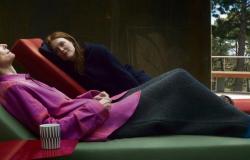Justin Trudeau did not want to abdicate. For a year, he said it, said it again and hammered it home. The Liberal Prime Minister held on for as long (or even longer) as possible, but he had to face the facts – or be forced to do so a little. His departure had become inevitable. By hanging on until the very end, however, he put the Liberal Party of Canada (PLC) in a very precarious position. Just like his political legacy, which he worked so hard to protect.
It was with dark circles in his eyes and his features drawn by this decision that he had feared for months that Justin Trudeau appeared Monday morning in front of his official residence to announce his upcoming resignation, when his party will have chosen a successor. “The country deserves a clear and real choice in the next elections. And it became clear to me that if I have to focus on internal battles, I cannot be the best option in these elections. »
His place at the head of the PLC and the government had become untenable. The quiet and polite calls for his departure made last fall had transformed into a “consensus” within almost his entire caucus — the caucuses of Ontario, Quebec and the Atlantic provinces, which represent between them 86% of his deputation, had come to this conclusion. Even his ministers refused to publicly support him during the pre-Christmas reshuffle. This shows the doubt that some of them expressed in private.
Rather than showing a little introspection, it is his fellow protesters that Justin Trudeau places his decision on. However, over the course of his nine years in power, the Prime Minister has not been spared from blunders or scandals. His political offer also lacked the momentum to renew itself and revive the popularity of his government. The discontent of his caucus – which he misjudged to the point of exploding it while trying to dismiss his minister Chrystia Freeland – was not completely disembodied.
That said, there is no guarantee, far from it, that the Liberals will have better fortunes without Justin Trudeau at the helm. Especially since the race for his succession will be short and whoever replaces him will only have a few weeks to prepare for the federal elections, which will not take long this spring. This election, the opposition parties will get down to it now (without worrying about the electoral spending limit), while the Liberal troops will manage their costly leadership race and the Prime Minister, awaiting his retirement, will try to somehow appease Donald Trump, the newly elected President of the United States.
The moment chosen to force this resignation, as well as to concede it, could not have been less ideal.
The decisive question will no longer be that of a referendum on the leadership of Justin Trudeau, but that of a choice of political vision for Quebec and Canadian society. And in this regard, the Liberal record is certainly not perfect, but it is not negligible either.
The attrition of the power of the Trudeau government has almost made us forget the very different portrait that Canada displayed at the end of the reign of the previous government, led by conservative Stephen Harper, 10 years ago. Withdrawal from the fight against climate change and the Kyoto Protocol; abolition of the long gun registry; building law and order into absolutes; reduction of international aid and end of financing of abortion abroad; refusal to cover basic health care for refugees; cuts in funding for culture; rejection of the role of the media as an essential part of a healthy democracy.
After three mandates, Justin Trudeau changed large facets of the legacy left by the Harper Conservatives and expanded the social safety net, notably with the Canada Child Benefit. Obviously not without defects and without excesses in public finances, in immigration and in stubbornly interfering in the jurisdictions of the provinces.
The political alternation of governments is healthy in democracy to avoid the complacency and arrogance of parties clinging to power for too long. But the alternatives nevertheless merit consideration.
Although Conservative Leader Pierre Poilievre, for whom polls predict a supermajority, has revealed very little information about his own political agenda, the few measures telegraphed so far — on the environment, on criminal justice, on reduction misdeeds, on the issue of gun control — are not without giving rise to some concern about a step back in line with the government in which he once took part.
It is now up to the Liberals to succeed where they criticized their leader for failing. By having made the Liberal Party the party of a single heir for 12 years, the Liberals could, however, have shot themselves in the foot.






